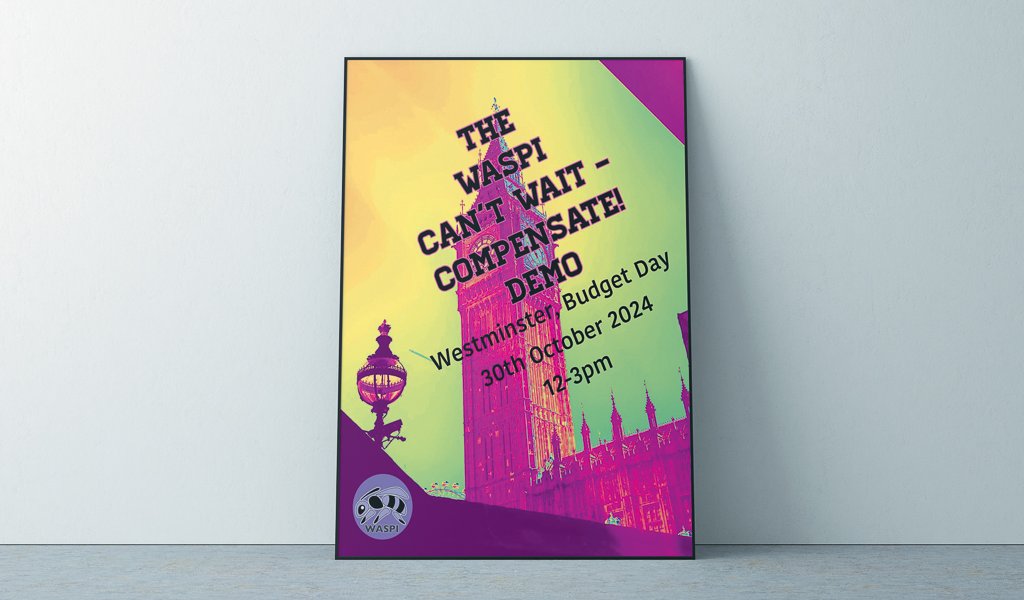Angela Madden of Wadshelf, is the national chair of Women Against State Pension Inequality (WASPI). She reports on how the campaign is going since the new Labour Government was elected.
FIRST, a quick recap as to what the WASPI campaign is about. Women born in the 1950s, who started working way back in the late 1960s/early 70s, always expected their State Pension to kick in on their 60th birthday, as it had for women since 1947. However, in 1995 the then conservative Government decided to equalise the State Pension starting age with men, gradually increasing women’s State Pension age to 65 between 2010 and 2020. The Government said they wanted to give women plenty of notice so that they could plan.
However, The Department of Work and Pensions (DWP) didn’t start informing women until 2009, some 14 years later. In 2010, the then coalition Government decided to increase the State Pension age to 66 for both women and men; this added up to 18 months more onto the State Pension age for the same group of women.
These changes combined saved the government a staggering £181 billion. These savings came straight out of the pockets of WASPI women, who were not informed, and so couldn’t make plans for their retirement.
“These savings came straight out of the pockets of WASPI women.”
Once women started getting these letters saying that up to six years had been added to their State Pension age, they thought “How can this be fair. I am only 2 years away from retirement. How can they only tell me now that I have to wait eight years for my State Pension?”
It was grossly unfair, and these women started to complain to their MPs, signed a petition and the original WASPI campaign was born in 2015. It didn’t take long to realise that we had a significant fight on our hands if we were to challenge the Government. We needed to raise money, we needed advice from legal experts, we had to organise ourselves. Today’s WASPI campaign was registered as a not-for-profit company owned by its members in September 2016.
We took legal advice and started a mass complaints process against the DWP. We sought to prove that the DWP maladministered the communication of the changes to the State Pension age for women, robbing them of the opportunity to plan their retirement properly. If found, the DWP could be ordered to put all women affected “back in the position we would have been in had the maladministration not occurred”.
We had to go through all stages of the DWP complaints process before our complaints could be looked at by the Parliamentary and Health Service Ombudsman (PHSO). Finally, in 2018, the PHSO took on our complaints. They selected six sample cases from the many thousands in the process and thoroughly investigated their claims.
In July 2021, they found that the DWP had maladministered the way they communicated the changes. They knew from their own surveys that women didn’t know about the changes, and didn’t do anything differently. This was maladministration.
After a legal challenge, the Ombudsman finally reported in March 2024 that this maladministration caused injustice, and all WASPI women deserved compensation and an apology.
In May 2024, the Work and Pensions Select Committee invited both the WASPI Campaign and the Parliamentary and Health Service Ombudsman to a special evidence hearing. The committee found that the Ombudsman’s report didn’t go far enough, and that alongside the injustices found in the six test cases there would be some instances of financial losses. Their findings were delivered to the then Secretary of State for Work and Pensions, Mel Stride. We were on the point of meeting with the DWP when the general election was called.
You may be thinking, well done WASPI – you got the result you wanted – but you would only be half right. Our campaign has been vindicated; all that we complained about to the DWP all those years ago was found to be true. But we are still waiting for the Government to accept the findings of the Ombudsman’s report and carry out their recommendations (apology and compensation for emotional injustice) alongside the additional recommendations from the Work and Pensions Committee (further compensation for those who can prove they suffered material or financial injustice).
Although when in opposition, the Labour Party appeared to be right behind us, with Sir Keir Starmer as leader of the opposition holding the Prime Minister’s feet to the fire and insisting that he paid WASPI women compensation before the summer recess, he doesn’t appear to be in that much of a hurry now that he has the power.
I, the North Derbyshire chair of WASPI, and my colleagues met with Emma Reynolds (the new Pensions Minister) on September 7. The meeting was very cordial, and Emma was definitely listening, but no promises were made and we are still waiting. We haven’t even got a timetable from them to let us know when they will start looking at how a compensation scheme might work.
Admittedly, Emma has only been in the job since July, but her peers were in Parliament when the report was laid before them, it is only 100 pages long and has quite clear recommendations. The transcript of the Work and Pensions hearing is even shorter and again has quite clear recommendations.
All we can do is keep the pressure up. We have been busy lobbying MPs since the Government convened in July. We have hosted a session for MPs in parliament; we have attended both the Labour and Liberal Democrat conferences; we are meeting with MPs regularly; and we have been working with the major unions and pensions organisations to get their support. More than half the house have signed up to our aim for ‘Fair and Fast compensation’ for WASPI women. Unite and Unison are actively campaigning on our behalf.
What next? We are hosting a demonstration outside parliament on budget day – October 30, from 12 noon until 3pm. We expect many thousands of WASPI women and supporters to join us in demanding that Parliament does what the Ombudsman has recommended and pay us compensation without delay.
Editor’s Note: Find out more about the campaign at wasps.co.uk






